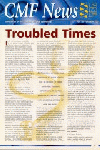I woke this morning to news of the Western alliance’s attack on Taleban and al-Qaeda positions in Afghanistan in retaliation for the 11 September terrorist attacks on the Pentagon and World Trade Centre. Restraining evil and protecting the innocent are concepts at the heart of Christian morality and most of us will want to see justice for the bereaved and for the people of Afghanistan, although Christians will be divided amongst those who support ‘just war’ and those for whom any military action is anathema. Given, however, that the war has started and that the evidence implicating Osama bin Laden and al-Qaeda seems solid, we need to pray that the alliance achieves its stated aims of disarming terrorist factions and installing a more just regime in Afghanistan; whilst limiting civilian casualties and providing for refugees. Given that 90% of British heroin comes from Afghanistan, there might also be hope for curbing drug trafficking!
But apart from the worries we all share about military action making the whole problem worse, there are other elements of the response to the ‘attack on America’ that disturb me.
First, I am disturbed by the disproportionate attention given to this terrorist attack in which 6,000 people died relative to other recent human tragedies both natural and man-made: the Turkish and Gujarati earthquakes, the Rwandan massacre or the silent epidemics of malaria, TB, AIDS and smoking-related illness. Every day worldwide 50,000 children die from diseases that are, in the main, easily preventable or treatable, and 160,000 unborn children die by abortion. Shouldn’t we be re-examining our priorities?
Second, I am disturbed by the prime minister’s 7 October statement that, ‘Islam is a peaceful and tolerant religion, and the acts of these people are contrary to the teachings of the Qur’an’. Whilst it is true that most Muslims have already distanced themselves from the 11 September atrocities, it is not difficult to demonstrate that the whole concept of violence against non-Muslims has its root in both the Qur’an and in the example of Muhammad himself. Tony Blair is understandably anxious to avoid offending Muslims at a time when the alliance against the Taleban remains fragile, but as well as misrepresenting the source texts of Islam he does a grave disservice to many non-Muslims who have suffered (and still are suffering) under Islamic regimes. Muslims in Britain should rightly be protected from attack, but I am equally wary of how secular authorities might now react to complaints about ‘islamophobia’ and ‘incitement to religious hatred’ by discriminating against Christians and Jews.
Third, I am concerned by the prime minister’s grandiose vision (in his 2 October speech) of a new international community solving every problem from deforestation to the Palestinian problem. It is one thing to call nations together to address a specific terrorist threat. It is quite another to promise world peace. History should remind us that such polemic has sometimes led in the past to the establishment of discriminatory regimes where minority groups suffer severe repression. World government is something of which Christians should be very suspicious (Rev 13:1-10).
Fourth, we must be careful not to idolise Western freedom and democracy. Those who live in countries (and there are many) where less than £2 per head is spent on healthcare per annum, where the best land is deployed to produce cash-crops for Western consumers and where 50% of the GNP goes on debt service to Western creditors hate the West with some justification. Many see the West’s financial institutions and multinational companies as the ‘weapons’ that global capitalism employs to oppress and enslave the developing world. Some may have seen the World Trade Centre as a legitimate target for ‘harbouring’ these organisations. Let’s not be blind to our own society’s failings. God judged Sodom because she was ‘arrogant, overfed and unconcerned’ and ‘did not help the poor and needy’ (Ezk 16:49) and the description fits the West quite well.
Which brings me to my final concern. We diminish God’s sovereignty if as Christians we deny his involvement in the events of 11 September. It is a sobering fact that the Bible regularly ascribes the most appalling acts to God’s meaningful purposes (for example see 2 Ki 19:25; La 3:37,38; Is 45:7; Am 3:6 and not least Acts 4:27,28). God is not averse to using evil people as his instruments of judgement, even against his own people (1 Ki 19:15-17; Is 10:5,6) and our Western civilisation’s idolatry, sexual immorality, shedding of innocent blood and materialistic self-indulgence must make us more than ripe for his judgement. We can be thankful for God’s patience and mercy in preserving us thus far, but we also need to take warning. When people asked Jesus about a tragedy in which people had died under a collapsing tower he said ‘unless you repent, you too will all perish’ (Lk 13:1-5).
As Christian doctors our response to these events has to be one of sober appraisal, humble repentance, practical compassion, earnest prayer and a radical rethink of our personal and professional priorities.
Peter Saunders, CMF General Secretary
A longer and fully-referenced version of this article is also available































